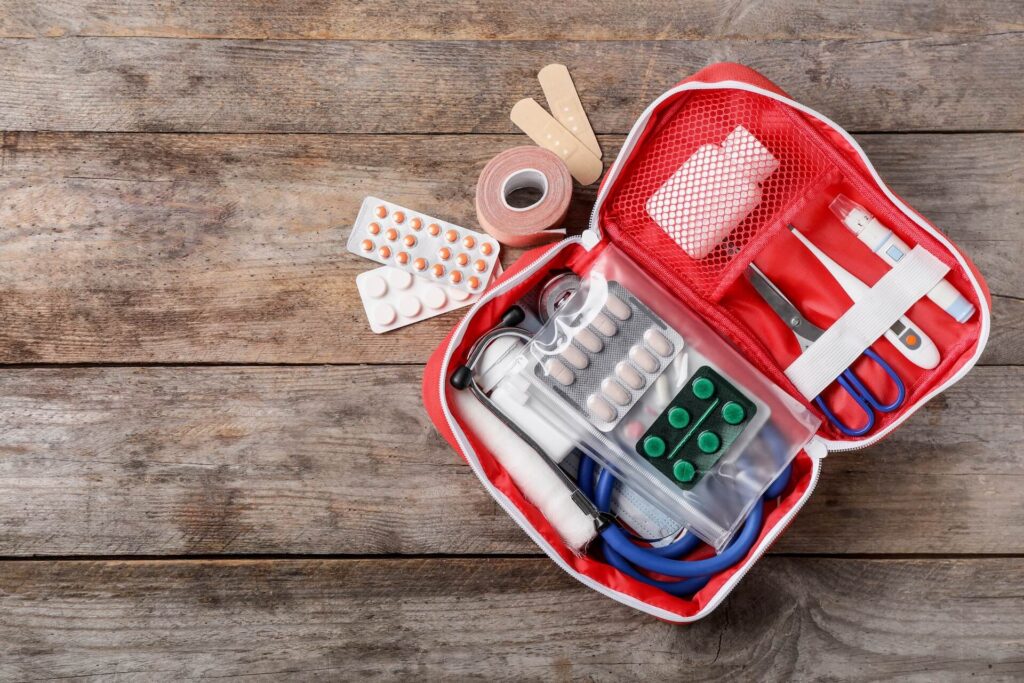Posted in
Moving Preparation, Moving Tips&Tricks
on June 1, 2022

Gemma Collins
Gemma is an NJ local that has explored all the US states, making her the perfect person to write about moving.
Relocating for Health? Here’s What Moving Day Preparation Should Look Like
Moving day preparation can go wrong quickly if you’re not organized. Those who plan to move out because of underlying health issues or improved healthcare opportunities have a little more at stake in that situation, so being prepared is doubly important. Here’s how to organize your move and stay safe throughout.
When Should You Start Preparing for a Move? It’s Best to Do It Several Weeks in Advance
It’s crucial to plan your move far in advance so you don’t come up with a question like, “What is the first thing to do on a moving day?” By then, you will have determined a relocation budget, found suitable packing services, and learned all the good relocation tips by heart.
The best moment to start planning your move is as soon as you find out it’s happening. If you also have health issues and difficulties making it all happen on your own, it’s more than vital to plan every step of the way.
Even if you’re relocating to another state alone while having an underlying health condition, make sure you aren’t ever truly alone in this process. Friends, family, and ultimately, professional movers should be there for you – but you have to plan when to schedule all of them, too.
What to Expect on Moving Day? Prepare a Checklist and Use All the Tips You Can Find
If you read this and thought: “Is there a checklist for moving?” we’re here to tell you that a checklist will be essential to prepare for your move and lead to tasks you never thought necessary for the process. Yes, a list is vital for relocation, and you can easily make one that suits your abilities and needs.
To start, consider your health condition and things related to it that can make or break your move; for example, you’ll have to take care of your health insurance when relocating to another state, be sure the medicine you use is available there, and that hospitals are near your home, so you don’t spend time crucial for your health in traffic.
Tips for Moving Day Preparation When You Move for Your Health
There are things people forget to do when relocating that you definitely shouldn’t. For someone generally very healthy, things like relocating in the right season or asking the doctor for approval to move out are a drop in the bucket; for you, it’s the most crucial aspect of the entire process. We know you won’t forget this, but here’s some advice, just in case.
Find the Right Season to Move
Perhaps relocating in the transitional seasons isn’t the best choice if you have allergies. Spring doesn’t just allow nature to bloom and grow – it also awakens sleeping hayfever and other severe allergies in sensitive people. Fall isn’t always bad, but those sensitive to ambrosia can experience difficulties during the autumn months.
When you choose a cross-country moving company, ask them if summer or winter is better for relocating. Summers are pretty hot and the peak of relocation season, so it may not be the best way to save on relocation costs. However, winters are just annoying, icy, and cold, but moves are more affordable and possible during this period.
Best Ask Your Doctor if It’s Safe to Relocate
To move safely, you need to have the go-ahead from someone who takes care of your health or oversees your medical condition. Paying a visit to your doctor sometime before you decide to move will be best; they’ll advise you on doing it safely and if it’s even a great idea.
Perhaps they also know reliable doctors in your destination state and can recommend someone good. Changing GPs is complex if the other state has different insurance rules and regulations, so any recommendation will be more than helpful.
If they can’t recommend anyone, ask what to look for in a new doctor. Insight from your GP will be one of the more welcome relocation tips.
Take Care of Health Insurance
Relocating can impact many parts of life, but your healthcare plan is the one thing you may not know it affects. Unfortunately, the US healthcare system is scattered, and you have to jump through hoops to change your insurance plan.
Even if you’re relocating at the last minute, it can be daunting to go through, so whatever you do, don’t forget to look into the health insurance plans in your destination state.
Those With Allergies Should Move to a Home That Doesn’t Have Too Many Triggers
Severe allergies can cause many health issues, so if you’re in an environment with many triggers, look into relocating somewhere safe for your well-being. If you need a break from wheezing and sneezing, try going to the seaside. Saltwater and the salty breeze can benefit your lungs, and if you have allergic asthma, it’ll be like a natural remedy.
There are fewer pollen trees in the coastal environment, although we can’t claim you won’t experience some allergic reactions to pollen here and there. However, it’ll be significantly less and easier to handle. If you’re not sure what the healthiest environment is, try doing a where should I move quiz.
If you have to downsize for a move and are allergic to house dust, try to clean everything first before packing it. Keep your windows open and air out the rooms whenever possible. Keep your allergy meds nearby at all times, and if you use an inhaler, leave it somewhere known.
Anyone With a Chronic Illness Should Prepare a Plan for Themselves
Chronically-ill people can have a hard time going through daily life; it can get even more complicated if they relocate with pets or children. Whether your chronic condition is severe or mild, you should contact a long-distance moving company to do the heavy lifting.
Problems with arthritis can make relocation extremely painful, and people with heart conditions should stay away from any lifting whatsoever. Professional movers can help you with anything, but if you feel like you must do something yourself, create a game plan for the stuff you can do.
For example, you can decide which items are for packing and which for throwing away before packing begins. You may not need storage services at the end of the move, and you won’t strain yourself too much. Whenever it starts to feel overwhelming, stop and take a break.
If You Have Heart Problems, Don’t Strain Yourself – Search for Long-Distance Movers Near Me
Anyone who suffers from a heart condition can have difficulties doing anything. Getting stressed is out of the question, and lifting heavy objects is borderline insane. You could do something that won’t cause too much trouble yet feel like important work.
How about communicating with different relocation companies? Ask them for quotes, compare them, and check their legitimacy by putting their USDOT numbers into the FMCSA database. It may seem counterintuitive to deal with business matters when chronically ill, but it’s easy to check for scams nowadays.
Your research will lead to the best services, so accept the notion of getting a relocation crew to help you. Movers take care of shipping large items, assemble, and disassemble them, so you don’t have to. They’re professional and (sorry to say this but) will do a better job than you could.
Moving Insurance
All your stuff is secure with Long Distance Movers, but in case something does happen to it, there’s a moving insurance policy in place. We offer both basic Valuation Coverage and Full Value Protection.
Learn more
Learn more
Storage Services
Our spacious climate-controlled units will protect your things until the drop-off. No need to worry about them because all items are labeled and secure, and each customer gets a dedicated unit mixup isn’t possible.
Learn more
Learn more
How to Pack Safely and Efficiently With the Help of Cross-Country Movers
When you plan to move out for the first time, you might be confused about which items to bring to the new home, where to get suitable boxes, and how to make everything come together ideally. This is challenging in any situation, but asking your relocation crew for advice can take you far.
You can ask them questions like do you need to remove clothes from the dresser for movers, should you empty drawers when moving, will you have to empty your car before they load it onto the trailer, what should you not pack when moving, and alike.
When you choose a packaging service from your relocation company and decide to do some of it yourself, preparing the essentials will be a big part of the process. Your plan a move to another city will go smoothly when you understand which stuff is crucial to pack on your own.
Pack Your Medical Equipment and Medicine in a Bag Close to You
When preparing for a move with a chronic illness, some relocation essentials are to secure your medication and other necessary equipment into a personal bag. Whether small inhaler machines or large CPAPs, they should come with you in a special package or bag.
You can travel with a CPAP because they have portable versions and battery-powered options, and they’re generally exempt from carry-on baggage restrictions by most airlines. Of course, you’d be better off doing some due diligence, so you don’t get turned back at the airport.
If you have permits and prescriptions for the medicine you use, put it all together in one bag. When you cross state lines, you’ll have the paperwork ready for checkups wherever you go. And in case you buy a brand-new portable CPAP, use it a few days before leaving to get used to it; it may feel a bit different than the one you’ve been using.
Prepare an Essentials Bag for the First Few Days of Living in Your New Home
The recommendation to prepare an essentials bag applies to anyone relocating. It’s a bag full of items you’ll need for the first week or two of your stay at the new home. Because your belongings may not reach their destination right away, which is normal, you should be prepared adequately for that situation.
Anything crucial for survival, bedding, toiletries, towels, food, underwear, and clothes should be a part of this package. The list will be a little more expanded for anyone ill but stay crucial nevertheless. Medicine, equipment, natural remedies, aids for sleep or nutrition, and whatever else you may require should also have a place in that bag.

If you're suffering from a chronic illness, your medication and equipment should be packed with care
Here’s a Quick List of Important Tasks for Relocating Safely and Efficiently
Every move requires a quick and easy relocation list to follow. We already mentioned the importance of a checklist and making it early enough to fulfill all the assigned tasks. However, if you’re not sure where to begin, here are some points to keep in mind:
- Figure out where to get packing materials, like packing paper and other wrappings, properly-sized boxes, labels for boxes, and duct tape,
- Change your address and utilities on time,
- Declutter your space and prioritize what to pack,
- Schedule long-distance moving services and others, like car shipping services, if necessary,
- Learn if you even need to ship your car across the country,
- Find out how much to tip your movers,
- Schedule move-out cleaning, and don’t forget to clean the apartment before you move in.
Make Sure You Have Enough Support if You’re Currently Under the Weather
Now that you know a little more about how to organize your move, the most important thing is yet to come – the actual relocation. When that happens, ensure you have all hands on deck. Maybe your friends and family can take out a few hours to assist you in relocating safely.
For example, depression is a chronic illness, too, and support for people suffering from it is crucial. Before making any plans and organizing every aspect of relocation, try to get people on your side. Their assistance and presence will be critical for the success of your move.
You can do this despite having it harder than most, going through loopholes, and constantly checking on your health condition. It’ll prove the immense strength your spirit holds and give you the chance to change your life for the better.










